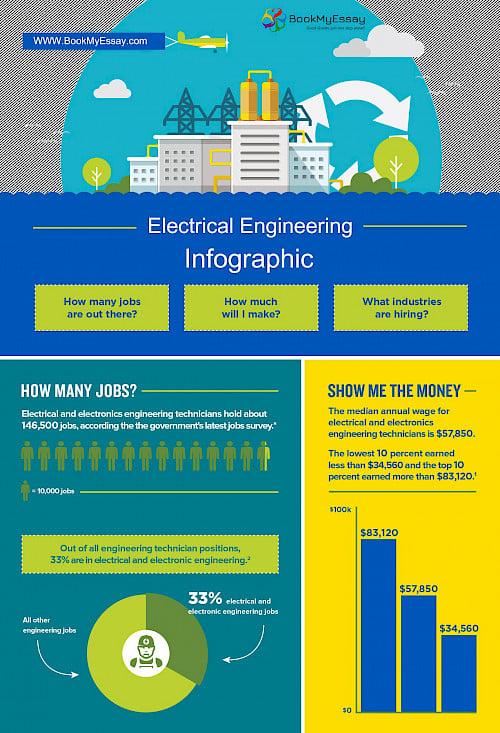ECE Engineering: Dive Into a Realm of Limitless Innovation

Blog / April 10, 2024
ECE (Electrical and Computer Engineering) stands as a beacon of hope, driving innovation and shaping the future. This multidisciplinary field of engineering encompasses an array of specialities including microelectronics, telecommunications, signal processing, control systems, and computer hardware and software design. From smartphones to smart homes, electrical and computer engineering has created serious havoc with avant-garde solutions impacting every aspect of contemporary living.
Amongst all, one of the most remarkable trends in ECE is the rapid innovation of semiconductor technology. Moore's Law, which predicts the doubling of transistor density roughly every two years, continues to hold true, albeit facing challenges in the last couple of years. Engineers are discovering/creating alternate materials and novel architectures to maintain this pace of growth, allowing smaller, faster, and more energy-efficient devices.
Are you enticed by the latest nerve-wracking innovations? Do high-speed cars and contemporary heat-controlling devices astonish your very thinking process? If so, exploring the field of B. Tech. in Electrical and Computer Engineering would be the best thing.

Source: https://www.bookmyessay.com/
The Future! Is It Secure?
Yes, absolutely! The future is lucrative and secure!
According to recent findings, the Computer engineering global market was valued at US$ 2412.17 billion in the year 2022 and is anticipated to cross US$ 3742.07 billion by the end of 2031, increasing at a CAGR of 5% during the forecast period, 2023 and 2031.
On the other hand, the global electrical engineering services market was valued at US$ 274.12 billion in 2022 and is expected to reach US$ 354.79 billion by 2030, growing at a CAGR of 3.28% between 2023 and 2030.
Hence, there is no wonder why the demand for the skills and knowledge of the B. Tech. in Electrical and Computer Engineering graduates is on the rise.
ECE Engineering Syllabus
The ECE Engineering syllabus may vary depending on various factors, including university, areas of specialization, and so on. However, below is the outline of core courses that you will cover in a four-year tenure:
- Analog Circuits
- Digital Electronics
- Semiconductor Devices
- Signals and Systems
- Control Systems
- Electric Machines & Power Systems
- Embedded Systems Hardware
- Electromagnetic Engineering
- Principles of Communication Engineering
- Digital Signal Processing
- Computer Organization and Design
- Artificial Intelligence and Machine Learning, and
- Power Electronics and Machine Drives
Electrical and Computer Engineering (ECE) Scope
As engineers are involved in research, developing new ideas, designing and creating new products and technologies, manufacturing, and marketing activities, Electrical and Computer engineers work at the forefront of technology and typically play crucial roles.
Listed below are some of the potential career options that ECE Engineering students can consider after completing their graduation. Have a look!
- Software Engineer
- Hardware Engineer
- Consulting Engineer
- Entrepreneurship
- Control Systems Engineer
- Power Systems Engineer
- Renewable Energy Engineer
- Electronics Design Engineer
- Embedded Systems Engineer and
- Telecommunications Engineer
Undoubtedly, the versatility of the skills attained by individuals in this field enable them to choose diverse and remunerative careers both in technical and non-technical roles.
Master the Intricacies of Electronics & Computing with a B. Tech. in Electrical and Computer Engineering @ Shiv Nadar University (Institution of Eminence)
Shiv Nadar University is a private university established and funded by Shiv Nadar, the Philanthropist and co-founder of HCL Technologies. The university is known for its dedication and commitment to offering top-tier education in various disciplines. Its B. Tech. in Electrical and Computer Engineering program is designed, on average, to offer students a comprehensive understanding of electronic systems, communication technologies, and signal processing. The program comprises a blend of theoretical knowledge and practical skills meant to offer students the holistic knowledge required to handle the dynamics of the industry.
On the other hand, the program focuses on critical thinking, problem-solving, and communication skills, the essential profile required in the engineering field. The School of Engineering at Shiv Nadar University offers a highly conducive atmosphere to innovation and research where students are provided with fully equipped high-tech labs and internationally recognized and skilled faculty. In addition, students can extensively avant-garde facilities where they can get their hands on projects, internships, and interdisciplinary research projects.
As a result, graduates of B.Tech in Electrical and Computer Engineering are professionals in a field that makes radical advancements in technology. Shiv Nadar University’s B. Tech in ECE engineering offers an all-inclusive educational experience that prepares students for gratifying careers in the dynamic field of electronics and computer engineering.
To Put It All Together
The Internet of Things and Artificial Intelligence are just part of the ECE innovation that seeks to confront tomorrow’s challenges. Clearly, electrical and computer engineering as a field continues to transcend all appropriate boundaries and thereby steers innovations and shapes technology. So, what has been in your mind? Come, join the B. Tech. in Electrical and Computer Engineering at Shiv Nadar University today!